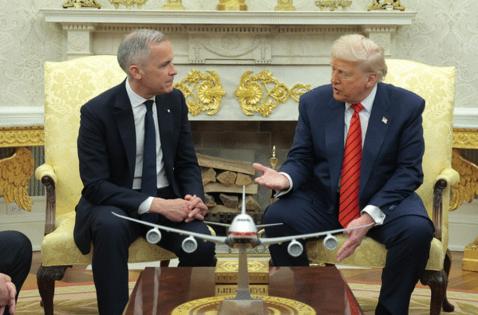Carney tempers trade expectations, says Canada won't sign a bad deal
Published in News & Features
OTTAWA, Canada — Canada’s prime minister sought to cool expectations about reaching a trade agreement with the U.S. in the next 10 days, saying the talks are difficult because the Trump administration keeps changing its goals.
“Canada will not accept a bad deal. Our objective is not to reach a deal whatever it costs,” Mark Carney told reporters in Huntsville, Ontario, after meeting with provincial leaders from across the country. “We are pursuing a deal that will be in the best interest of Canadians.”
“The American objectives are multiple. They change from time to time,” the prime minister added.
Still, Carney’s government is making a push to get a deal by Aug. 1 — the date on which President Donald Trump has threatened to levy tariffs of 35% on some Canadian goods that aren’t covered under the existing North American free trade pact. Steep American tariffs remain in place on steel, aluminum and autos. Canada’s position is that all of those levies violate the U.S.-Mexico-Canada Agreement, which Trump signed in his first term.
Dominic LeBlanc, Canada’s lead cabinet minister on U.S. trade, will be in Washington later this week along with senior staff from Carney’s office. A spokesperson for LeBlanc declined to say who the minister will be meeting with.
If the two sides can’t come to terms by the beginning of August, Carney said Canada will “take stock” of the situation, but he didn’t specifically answer a question about whether the government would formally retaliate.
Carney has so far declined to match a move by Trump that increased steel and aluminum tariffs to 50%. However, the prime minister promised last month to “adjust” Canada’s counter-tariffs on U.S. metals, depending on the progress of negotiations — an implied threat to raise them from the current 25% if there’s no deal.
As the government tries to reach a deal in Washington, it will also focus more effort on building trade with non-U.S. partners, Carney said. “Our phone is ringing off the hook from other countries who want to do more with Canada,” he said.
After meeting with Carney, some leaders of Canadian provinces also lowered expectations of reaching a deal in the short term.
“I haven’t been focused on the date,” Tim Houston, premier of Nova Scotia, said of the Aug. 1 target. He said that insisting on getting a deal by a certain day might force Canada to “give up some leverage that we might not otherwise have to if we just focus on getting the best deal.”
Trump has made a series of demands of the Canadian government, including boosting security at the countries’ shared border, spending more on its military, dropping its digital services tax and removing protections on the agriculture sector. The government has done the first three of those things — but the president has still escalated his tariff threats.
“Of course we would like to have the ideal deal, the fastest possible,” Quebec Premier Francois Legault said. “But what can we get? You almost need to ask Donald Trump, and I’m not even sure he knows himself what he wants.”
Canada and the U.S. have one of the world’s largest trading relationships, exchanging more than $900 billion of goods and services last year. Canadian consumers and businesses buy more from the U.S. than any other country, according to data compiled by the US Commerce Department.
But things have grown tense since Trump won the election, especially after the president repeatedly made the suggestion that the northern country should become the 51st state — an idea that is opposed by a large majority of Canadians, according to polls.
_____
©2025 Bloomberg L.P. Visit bloomberg.com. Distributed by Tribune Content Agency, LLC.







Comments